As it happened: Reading of 2019/20 budget
Finance minister Matia Kasaija presented a sh40trillion budget.
BUDGET READING DAY
Welcome to this timeline that focuses on Uganda's 2019/20 national budget that was presented to Parliament by finance minister Matia Kasaija. This page carried live updates from the event, which took place at Kampala Serena Conference Centre, as well as related information and social media interactions in the buildup. Scroll down for earlier updates.
____________________________________
Live reporting by Joseph Kizza
@joekizza
____________________________________
6:40pm
HOUSE ADJOURNED
____________________________________
6:34pm
President creates new funds
Museveni says that during his recent wealth-creation trips upcountry, he created more funds to empower the various groups. One of the funds is for value addition (for import substitution and export promotion), which will be on a zonal basis.
@KagutaMuseveni The people outside the money economy need sensitisation. My appeal to all the leaders - political, religious is to work to modernise the family. Convince them to join the money economy. #UGBudget2019 pic.twitter.com/xm7rF1PF0m
— Carolyne (@Muyama) June 13, 2019
____________________________________
6:29pm
'Help modernise families'
"My appeal to all leaders is, please work to modernise the families or a family under your influence, by convincing them to join the money economy," urges the President.
____________________________________
6:23pm
I am a traditionalist who wants a stronger Africa - Museveni
Commenting on the divisive issue of the late Prof. Apolo Nsibambi's heritage, President Museveni says: "I am a traditionalist, but a traditionalist who wants a stronger Africa."
It emerged that the fallen former Prime Minister, before his death, had chosen his daughter to become his heiress. This decision sparked divided public opinion, with the conventional minds strongly critical of Nsibambi's move and the liberal minds okay with it.
Prof. Nsibambi had told me about making his daughter the heir. When dealing with issues, I never start with legality, but legitimacy. Is it right for girls to inherit from their parents, in modern times, the answer is an equivocal yes.#UGBudget2019 pic.twitter.com/iPYSo2CxJG
— New Vision UGANDA (@newvisionwire) June 13, 2019
____________________________________
6:14pm
The transformation of people in the cattle corridor has enabled them to live better lives, install solar power, send their child to school, etc, says Museveni.
"Once you transform the households, you empower the country."
____________________________________
5:37pm
'I am an expert on Opposition issues'
Museveni says that for 24 years after Uganda's independence, he was in the Opposition and therefore "I am an expert on Opposition issues".
Laughter across the hall ensues.
____________________________________
5:30pm
Arrests for vandals
With the installation of security cameras, anybody seen vandalising public assets will be arrested and they will pay for whatever damage they have done. Same applies to vehicles that damage road furniture, says the President after cautioning the public to avoid shaking hands - and instead wave in greeting - because of the latest Ebola scare in the western part of the country.
____________________________________
5:27pm
President Museveni delivers his comments
After the finance minister steps off the dais with a rousing applause, President Yoweri Museveni steps forward to make his comments on what his minister has presented.
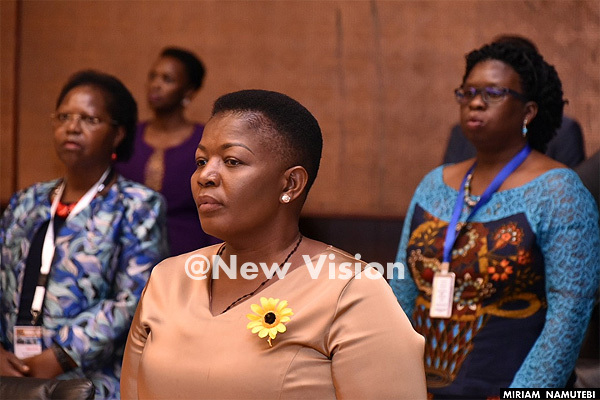
____________________________________
5:26pm
DEBT: Government to 'exercise caution'
"Madam Speaker, I would like to assure the country that our debt remains sustainable in the medium to long term, assures Minister Kasaija.
"Government will continue to exercise caution while taking on new debt. The rate of debt accumulation is expected to reduce in the medium term, as flagship infrastructure projects are completed."
In his concluding remarks, the minister urges "the youth and women of Uganda to seize opportunities that will build their skills".
____________________________________
5:25pm
Resource envelope for new FY
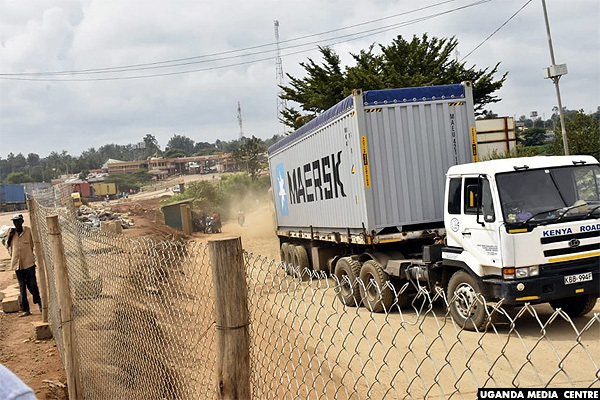
Minister Kasaija says that the resource envelope for 2019/20 totals sh40.487 trillion, of which tax and non-tax revenue amounts to sh20.895 trillion.
Domestic financing amounts to sh2.829 trillion while external financing consists of project support of sh9.433 trillion and general budget support of sh675.2bn.
Domestic re-financing amounts to sh6.452 trillion and appropriation in aid is sh201.1bn.
In 2019/20, as a ratio of GDP, the budget deficit is projected at 8.7% compared to 5.8% in 2018/19.
"This deficit, as usual, will be financed largely through external borowwing and to a lesser extent through domestic borrowing.
On public debt . . .
We understand that the stock of Government debt rose to sh42.760 trillion as at end-December 2018.
External debt constitutes 66.5% of the total debt and this amounts to sh28.427 trillion.
____________________________________
5:23pm
Some of the tax measures
- The Excise Duty Act was amended to provide for registration of manufacturers, importers and providers of excisable goods and services.
- Income derived from leasing or letting facilities in industrial parks has been exempted from income tax for 10 years from the date of commencement of construction.
- The Stamp Duty Act was amended to provide for a uniform stamp duty.
In addition to VAT exemption on agro-processing, rice mills and agricultural sprayers have also been exempted from VAT.
- Introduction of a 6% withholding rate for VAT.
- To promote investment and industrialisation, import tariffs on products which are locally manufactured have been increased.
Meanwhile, interventions in tax administration to be implemented in 2019/20 include:
- Use of Electronic Fiscal Devices to improve compliance in VAT
- Use of a digital tax stamps solution to avert under-declaration of excise and customs duties
- Enhance rental income tax collection.
- Purchase and deploy scanners at major ports of entry into Uganda
- Expand deployment of the Electronic Cargo Tracking system to eliminate dumping of imports in the Ugandan market.
____________________________________
5:15pm
Domestic revenue mobilization
The plan across the next five fiscal years is to review tax policies, involving taxpayers more fully in the tax policy formulation process and also to promote an attractive business environment to potentional investors.
Government plans to support investment in human capital, eliminate revenue leakages and enforce tax obligations, among sEveral other interventions.
Domestic revenue projections for the next financial year amount to sh20.449 trillions.
"Madam Speaker, next financial year, URA will collect all Government revenues including Appropriation in Aid (AIA).
____________________________________
5:10pm
Interests and payments, security
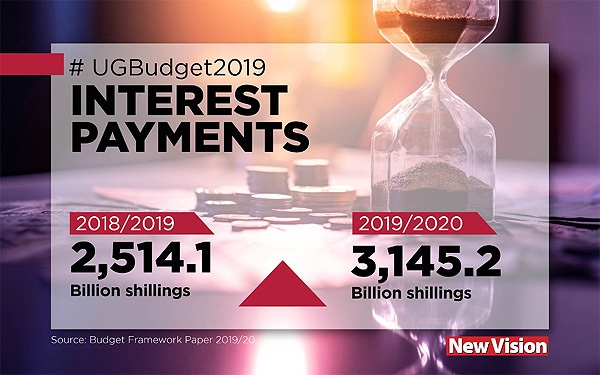
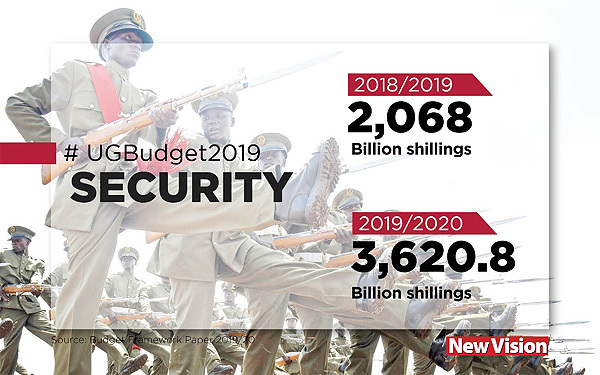
____________________________________
5:04pm
Health sector's share
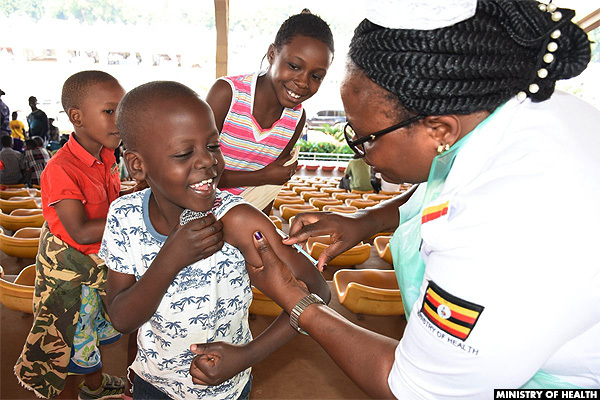
In the health sector, government plans to improve the functionality of lower level health facilities as well as streamline the health referral system to reduce pressure on super-specialised Mulago National Referral Hospital.
Government also plans to build staff houses and maternity wards in 81 health centres supported by the World Bank Reproductive Maternal Chaild Health Services Improvement Programme.
The health sector has been given sh2.6 trillion.
____________________________________
5:04pm
Education's portion
Sh3.4 trillion has been given to the education sector.
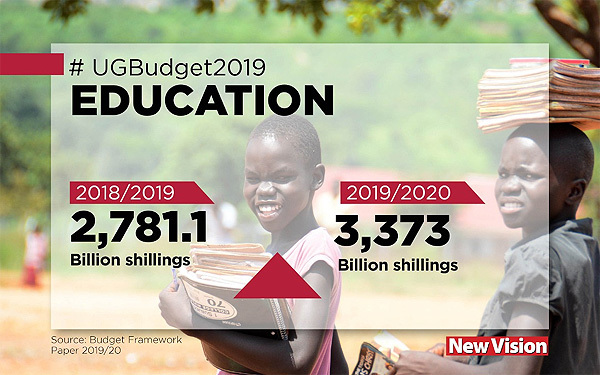
____________________________________
5:00pm
Human development - education, sports
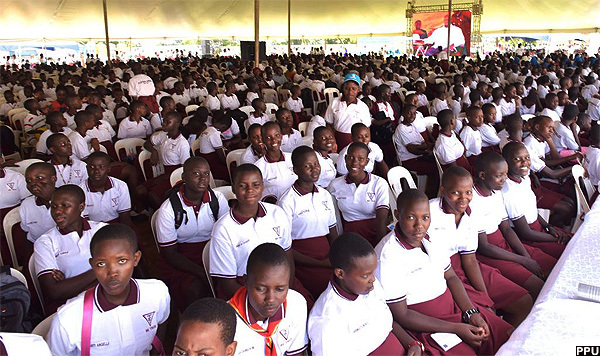
In terms of skills training, critical infrastructure for technical and vocational training has been built. Currently, 55% of all districts have technical and vocational institutions.
In sports, the construction of the national high altitude centre in Kapchorwa is 68% complete and the Nakivubo Stadium is undegoing reconstruction.
"I congratulate the Uganda Cranes for qualifying to the Africa Cup of Nations for the second time running".
____________________________________
4:57pm
Internet connectivity
In this coming year, the plan is to have the National Backbone Infrastructure for ICT extended to cover all districts.
"Internet costs will be reduced through the implementation of the new national broadband policy," says Kasaija.
"Madam Speaker, sh146.2bn has been provided next financial year to the ICT sector."
____________________________________
4:50pm
Subsidizing electricity
Total installed electricity generation capacity is now 1,200MW, with the completion of several hydropwer generation projects including Isimba Hydropower dam.
"The Electricity Connection Policy will continue to subsidize the cost of electicity connections," says the finance minister.
Energy sector gets sh3 trillion.
____________________________________
4:44pm
Works and transport share
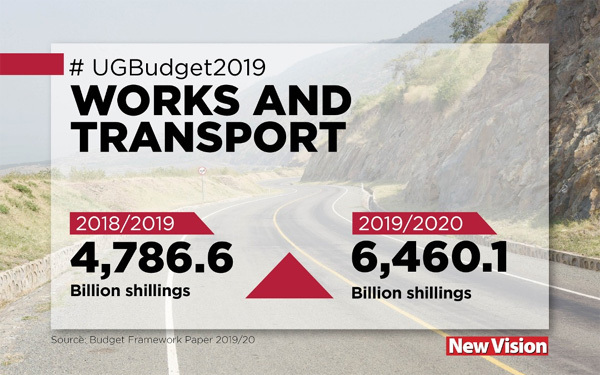
____________________________________
4:44pm
5,111km of roads paved
The paved road network now is 5,111 kilometres, says the minister, adding that 97% of the national paved road network and 83% of unpaved roads were reported to be in fair to good condition.
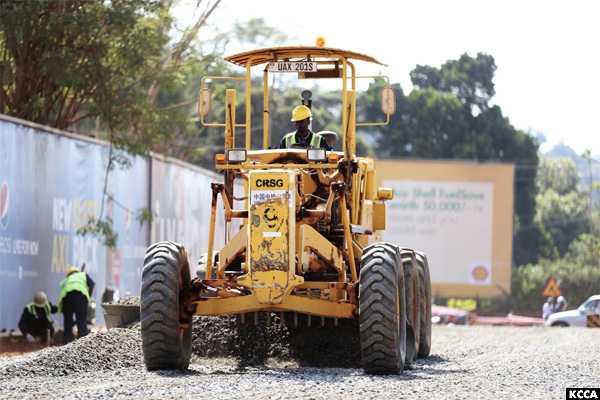
____________________________________
4:40pm
Mineral sector
In this coming financial year, some interventions will be undertaken in the mineral sector. 18 priority mineral target areas will be explored for rare earth and metallic minerals.
The licesing rules and regulations will also be reviewed.
____________________________________
4:35pm
Tourism
Among the plans for the tourism sector in this financial year will to upgrade and renovate key tourism infrastructure, including airfields and priority roads to improve accessibility.
Finance has allocated sh193.7bn to the tourism sector.
____________________________________
4:31pm
Commercialising agriculture efforts 'bearing positive outcomes'
Kasaija says that government's efforts to modernize and commercialise agriculture "are bearing positive outcomes".
Coffee export volumes in 2018 increased by 6% to 4.5 million bags . Oil palm production in Kalangala also increased.
Meanwhile, government plans to provide sotorage facilities and link farmers to agro-processing facilities to supoort agro-industrialisation.
It also plans to provide irrigation infrastructure both small and large scale.
Sh1.54 trillion has been given to the agriculture sector.
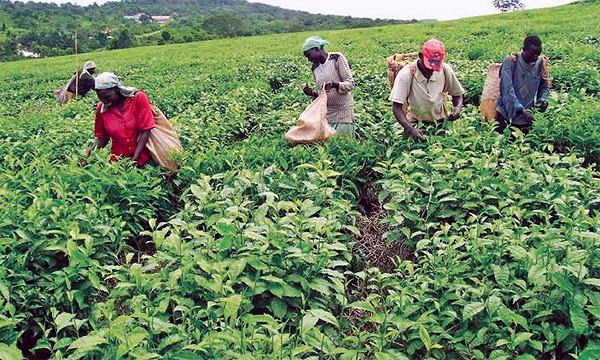
____________________________________
4:27pm
"I have provided sh428.68bn for electification of industrial parks, developmemt of supportive expeor infrastructure in export processing zones and industrial parks and ICT," says the minister.
____________________________________
4:23pm
Industrialising the economy
As regards industrialisation, Government has started the establishment of an industrial base. The iron and steel industry now has 24 steel industries and its installed capacity has doubled to 1.7 million tonnes per annum from 886,000 tonners five years ago.
The finance minister speaks of agro-processing factories have been commissined in Teso and Luwero for citrus fruits, dairy in Ankole, vegetable oil in Kalangala and tea in Toro and the Kigezi sub-regions.
____________________________________
4:20pm
On microfinance
In the coming fiscal year, the Uganda Development Bank (UDB) will be further capitalized.
"I have alloctaed sh103.5bn next financial year for this purpose," says Kasaija.
To support private companies in raising equaity capital, the Capital Markets Authority will establish a centre to facilitate access to lonf-term domestic and foreign captial on the stock exchange.
The Uganda Microfinance Regulatory Authority is now fully operational "to enhance consumer and investor confidence in the microfinance industry and money-lending business."
___________________________________
4:14pm
Priority minerals
For the minerals, oil and gas sector, the minister says the priority minerals to be exploited include iron ore, limestone, phosphates, oil and gas, dimenstion stones, gold and rare earth metals.
___________________________________
4:11pm
Tourism highest forex earner
The tourism sector has made dramatic progress and currently ranks as the highest foreign exchange earning sector, says the minister.
This year, appropriate legislation will be enacted and vigorously enforced to preserve cultural sites and monumnets and deter illicit trafficking of protected wildlife and antiquities.
World-class skills will be built in hospitality and tourists handling, wildlife conservation, tour and travel management, food and beverage services.
___________________________________
4:05pm
Addressing climate change
To tackle to biting issue of climate change, Kasaija says reafforestation and restoration of wetlands must be undertaken as a matter of urgency.
Destruction of wetlands and forest cover "well be penalized through the enforcement of environmental laws and regulations. Local governments must enact and enforce ordinances on tree planting, efficient waste managment and wetland conservation".
___________________________________
4:02pm
Key bottlenecks largely addressed - Kasaija
The finance minister says that the Government has "already successfully laid the foundation" for Uganda's industrialization.
Key bottlenecks, including inadequate electrity and transportation infrastructure and lack of basic education and health have largely been addressed.
Commercialising agriculture has the greatest potential for increasing household productivity and incomes, says the finance minister. But this should be done while also addressing unemployment in the rural communities.
___________________________________
3:57pm
Financial sector has continued to strengthen

Minister Kasaija says:
- Domestic prices remain stable. Average inflation was 3.4%, well within the policy target of 5% per annum.
- The Uganda Shilling has largely been stable against major currencies.
- The financial sector has continued to strengthen. Non-performing loans reduced to 3.4% at the end of December last year, compared to 5.6% the previous year.
- Domestic revenue collection has increased significantly. It is projected at sh16,711bn in 2018/19, of which sh16,181bn is tax and sh530bn is non-tax revenue.
Government spending excluding domestic debt refinancing this financial year is projected to be sh24,297bn, which is equivalent to 22.1% of GDP.
___________________________________
3:53pm
Services sector registered highest growth rate
The agriculture sector maintained its recovery, sustaining a 3.8% growth rate in 2018/19.
The minister says enforcement of fishing activity helped in the recovery of fish catches and that provision of extension services and control of pests and diseases also boosted harvests in crops such as maize, beans, fruits and vegetables.
The services sector grew at 7.2% last financial year. It was the highest rate of all the sectors.
The industry sector grew at 5.8% this year.
___________________________________
3:47pm
With Africa's economic performance continuing to recover on the global scene, the minister says the EAC region is the fastest growing economic bloc in Africa.
"Uganda's trade with other African countries is increasing, and amounted to 59% of total goods exported in 2018," he says. Total goods exported to the EAC amounted to $1,469m compared to imports of $911m.
We understand that Uganda's economy is estimated to have grown by 6.1% in 2018/19. The size of the economy is now sh109 trillion.
___________________________________
3:42pm
Three major challenges
"The 2019/20 budget focuses on intervnetions aimed at increassing the wealth and improving the livelihoods of all Uganda," says the finance minister.
___________________________________
3:39pm
Three major challenges
Kasaija picks out three major development challenges that Uganda is still grappling with. Unemployment, income inequality as well as malnutrition and unhealthy lifestyles.
He says "53% of children under five years are malnourished and hence anemic, and 29% of them are stunted or wasted".
Meanwhile, inappropriate feeding, especially among the more affluent, is a major cause of a surge in chronic non-communicable diseases. Coronary heart disease, cancer, diabetes, high blood pressure and obesity are some of them.

___________________________________
3:35pm
Substantial strides for Uganda
The minister says that Uganda has made substantial progress towards the goal of a middle income status as underlined by some examples:
- The economy has recovered and picked momentum. It has grown at over 6% per annum over the last two years.
- Average incomes of Ugandans have increased.
- The quality of Uganda's labour force has "dramatically improved". We understand that the proportion of the labour force with tertiary education has increased from 7.5% in 2013 to 13.6% in 2017.
- Services have increased to 48.7% today from 32% in 1986.
- In terms of export performance, diversification has led to non-traditional cash crops fetching Uganda $2.84bn last financial year.
- Trade with the EAC partners has "significantly improved", generating a surplus of $557m last year.
- National grid electricity connections have increased to 1.3 million customers.
- Many new factories have been opened. The impact is that Ugandan products in supermarkets has increased from 15% to 45%. Here, the target it to reach 50% by the year 2020.
___________________________________
3:29pm
FINANCE MINISTER READS BUDGET
"In accordance with Artical 155(1) of the 1995 Consistution of the Republic of Uganda and Section 13(13) of the Public Finance Management Act 2015, I presented the budget proposals for Financial Year 2019/20 to Parliament on March 28, 2019. I applaud honourable Members of Parliament for their dedication in the reviewing of the proposals and the approval of the budget on May 24, 2019," he starts off.
He says that his statement presents the economic and development context under which the new fiscal year budget was prepared and highlight the priority actions that "underpin the allocations that have been appropriated by Parliament".
___________________________________
3:20pm
Proclamation by the Speaker of Parliament
Speaker Rebecca Kadaga proclaims that today, the Parliament is sitting at Kampala Serena Conference Centre.
___________________________________
3:00pm
President enters venue
That was 15 minutes of the preliminary session of this official event. President Yoweri Museveni and the First Lady are led into the conference hall, ready to kick off the next session.
President @KagutaMuseveni arrives for the #UGBudget2019 reading @kampalaserena . Watch live updates on UBC TV. pic.twitter.com/MvQIl3MyBf
— UBC UGANDA (@ubctvuganda) June 13, 2019
___________________________________
2:45pm
PRESIDENT YOWERI MUSEVENI ARRIVES AT SERENA
He is accompanied by his wife, First Lady Janet Museveni, who is also the Minister of Education and Sports.
They are then led out of the compoud where a guard of honour is mounted.
Anthems will start off here.
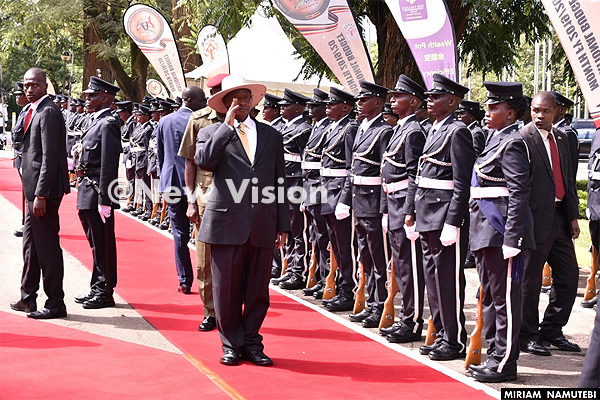
___________________________________
2:20pm
Constraints in private sector
According to the Government Citizen Interaction Centre, the 2019/20 aims to tackle constraints that the private sector faces.
The #UGBudget2019 aims to address constraints that the private sector faces and improve private sector competitiveness through supporting SMEs & access to credit et al. It reflects @GovUganda's medium term budget theme - ‘Industrialization for Job Creation and Shared Prosperity'. pic.twitter.com/8zON0KTxf0
— Government Citizen Interaction Centre (@GCICUganda) June 13, 2019
___________________________________
2:15pm
The sanitary pads issue
The discussion on the budget is going on at the Vision Group head office in Kampala. One of the panelists is student Yvonne Tesire, who is weighing in on the sticking issue of menstrual hygiene.
Yvonne Tesire: Students are burdened by the cramps, having to wash the reusable pads while others have mothers who don't think their daughters should use pain killers to calm the pain down. #UgBudget2019 pic.twitter.com/iGyY0Ee6Q9
— New Vision UGANDA (@newvisionwire) June 13, 2019
___________________________________
2:09pm
SERENA: The stage is set
Soon, we shall get under way.
Preparations of the reading of the National budget are in high gears at the Kampala Serena Hotel.
— Musinguzi Laban (@labanjoshua52) June 13, 2019
The budget month has been organised by @mofpedU @URAuganda and @CSBAGUGANDA.
The National Budget is expected to be read at 2pm by HON. @MatiaK5.#KnowYourBudget19 pic.twitter.com/PLRsYSdDPI
___________________________________
1:56pm
Strikes 'a very terrible trend'
New Vision education editor Conan Businge is on Urban TV discussing the national budget. He says solving problems with strikes is a "very terrible trend".
This Government and people are used to solving issues with strikes, which is a very terrible trend - @cbusinge #YouthPerspectiveUG #UgBudget2019 pic.twitter.com/I52AdLy5a4
— Urban Television (@UrbanTVUganda) June 13, 2019
___________________________________
1:50pm
FINANCE MINISTER ARRIVES AT SERENA
The man with the brief case has made appearance at Kampala Serena Conference Centre. A grand entry it is.
Matia Kasaija is ready to soak in the limelight.
___________________________________
1:41pm
Discussing the budget at Vision Group
As the event at Serena crawls ever closer to its official start, at the Vision Group head office in Industrial Area, a panel featuring various stakeholders is convening to discuss the budget.
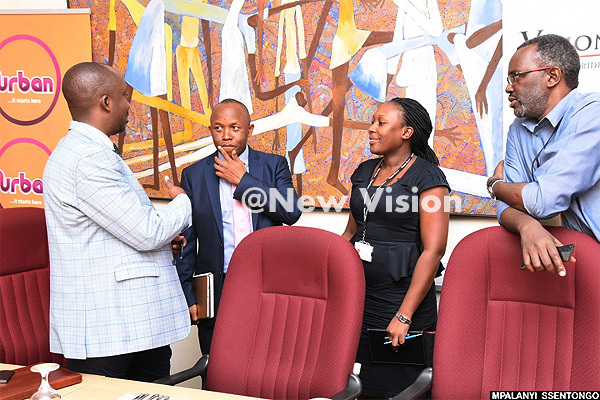
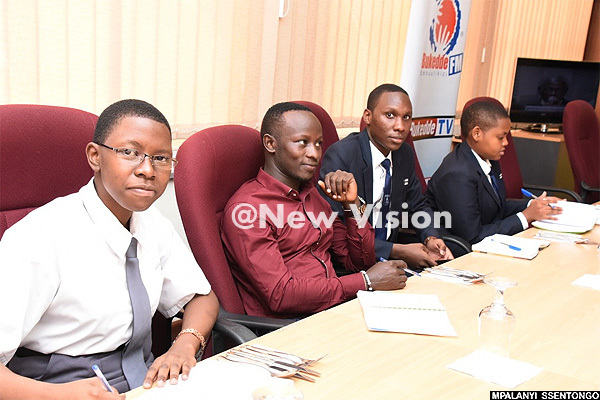
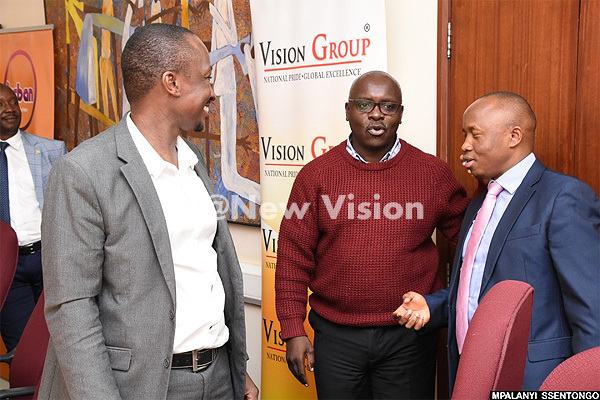
___________________________________
1:33pm
What are your thoughts on the new budget?
Join the conversation on Twitter by using the hashtags #UGBudget2019 and #YouthPerspectiveUG
____________________________________
1:24pm
Uganda exporting more to Kenya, South Sudan
Meanwhile, Uganda's formal exports to the East African Community (EAC) partner states have been on the rise, increasing from $425.2 million (about sh1.6b) in 2010 to $1,255.28 (about sh4.7 trillion) in 2018, with exports to Kenya and South Sudan registering the fastest growth.
The graphic below, illustrates information sourced from Bank of Uganda on Uganda's formal exports to the EAC.
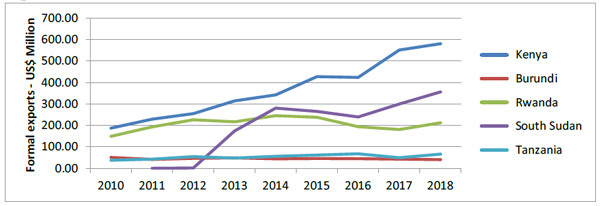
____________________________________
1:16pm
All roads leading to Serena
Today's budget will be delivered at the meeting of the 4th Session of the 10th
Parliament of Uganda at the Kampala Serena International Conference Centre.
Already, the venue has various stakeholders sat and mingling as the official start of the event nears.
____________________________________
12:57pm
Tune in to Urban TV

Join the conversation on Twitter by using the hashtags #UGBudget2019 and #YouthPerspectiveUG
____________________________________
12:48pm
Sending money back home

Projections indicate that the annual remittance flows to low- and middle-income countries are likely to reach $550 billion (about sh2 trillion) and $574 billion (about sh2.2 trillion) in 2019 and 2020 respectively.
Globally, the average cost of sending remittances remained unchanged at about 7 percent in the first quarter of 2019, as has been in the recent past. The cost of sending money to Sub-Saharan Africa was 9.3%, which is about three times higher than the SDG target of 3%.
You may also want to know that evidence shows that banks were the costliest channels for transferring remittances, with the average cost of 10.9%.
____________________________________
12:40pm
'Is human capital development a priority?'
Asks Twitter user Patricia Munabi, who says "no funds have been allocated to menstrual hygiene".
The health sector has been given a share of sh2.5 trillion of the next budget.
In #UGBudget2019 no funds have been allocated to menstrual hygiene yet 3 out of 5 girls drop out of school every year during their menses. Is human capital development a priority? #GenderBudget @FOWODE_UGANDA @CSBAGUGANDA @ugandadebtnet @amwaafrika @KaviriAli
— Patricia Munabi (@patriciamunabi) June 13, 2019
____________________________________
12:23pm
Key challenges for international trade
According to the finance ministry, world trade is projected to continue to face key challenges in 2019 and 2020. New tariffs and retaliatory measures which mainly affected traded goods, weaker global economic growth, volatility in financial markets contributed to the slower than expected growth in 2018.
Meanwhile, foreign aid from official donors dropped by 2.7% in 2018 compared to 2017, with a further decline in the share going to the neediest countries.
Uganda is one of the leading refugee-hosting nations in the world. It is understood that the drop in foreign aid was largely due to less aid being directed towards hosting refugees. Reduced arrivals of refugees and tightening of the rules on which refugee costs can come out of official aid budgets were to a great extent responsible for this drop.
____________________________________
12:15pm
The budget trend
Ours has been a growing budget . . .
#UGBudget2019 Uganda's budget trend from 2016 shows #SteadyProgress.
— JHAM (@mbabaziandrew) June 13, 2019
2019 - Sh40 trillion
2018 - Sh32 trillion
2017 - Sh22 trillion
2016 - Sh20 trillion @FavoredOgwal @StateHouseUg @URA_CG @URAuganda pic.twitter.com/m1tu64v2nf
____________________________________
11:57am
Uganda's economy through a global lens
So how do global developments influence and impact on Uganda's development agenda, you may wonder?
This could help:
Over a year ago, economic growth was promising across the world, with growth projected at 3.9% in 2018 and 2019. However, the recent developments that include the escalation of US-China trade tensions, macroeconomic stress in Argentina and Turkey, disruptions to the auto sector in Germany, tighter credit policies in China, and financial tightening alongside the normalization of monetary policy in the larger advanced economies such as USA have all contributed to a significant weakening of global expansion over the last one year.

Global economic growth was projected to reduce from 3.6% in 2018 to 3.3% in 2019, and then return to 3.6% in 2020. Emerging market and developing economies are expected to experience improvements in growth in 2020, arising from likely improved macroeconomic stability.
Global growth is projected to remain stable at about 3.6% beyond 2020 and the medium-term.
Check out this illustration of the global economic growth trend . . .
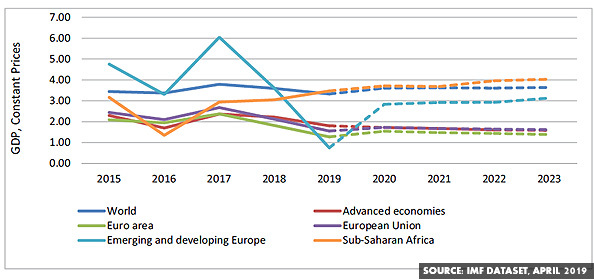
____________________________________
11:50am
Breaking down the budget

By the time finance minister Matia Kasaija steps forward to read out the budget to Parliament this afternoon, we (most of us) would have already known how much every key sector will be getting off the national cake.
His presentation will be seen as a formality.
Here is a breakdown of the budget allocation:
- Debt repayment 10.6 trillion
- Works and Transport 6.4 trillion
- Defence and Security 3.6 trillion
- Education 3.2 trillion
- Energy 2.9 trillion
- Local Governments 2.8 trillion
- Health 2.5 trillion
- Accountability 1.9 trillion
- Justice, Law and Order Sector 1.6 trillion
- Agriculture 1 trillion
- Water and Environment 1 trillion
- Public Administration 908b
- Public Sector Management 789b
- Parliament 688b
- Social Development 218b
- Lands, Housing and Urban Development 193b
- Tourism 175b
- Trade and Industry 171b
- Science and Technology 159b
- ICT 123 billion
TOTAL: 40.4 TRILLION
____________________________________
11:29am
'Gains in annual economic growth'
Over the first four years of the NDP II period, annual economic growth averaged 5.3%, with real per capita Gross Domestic Product (GDP) increasing from $751 (about sh2.8m) at the end of NDPI in financial year 2014/15 to $825 (about sh3m) in 2018/19.
According to the finance ministry, "these gains have been achieved alongside a population increase of four million people, from a mid-year population of 35 million people in FY 2014/15 to 39 million in FY 2018/19".
You would want to look at economic growth as the increase in the volume of goods and services a country produces in a given period of time -- typically a year.
____________________________________
11:20am
The theme
By the way, the coming financial year (2019/20) is the fifth and final implementation year of the second National Development Plan (NDP II). And as in the 2017/18 and 2018/19 financial years, the next budget has retained the theme Industrialization for job creation and shared prosperity.
This theme has run across the annual budgets of all East African Community (EAC) partner states over the same period, and is in line with the NDP II theme of Strengthening the country's competitiveness for sustainable wealth creation, employment and inclusive growth.
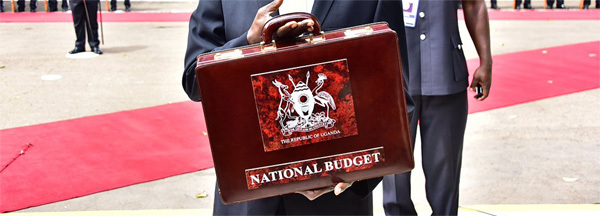
____________________________________
11:05am
Take a look
Economic growth has been sustained averaging about six percent over the last two decades, while monetary discipline was maintained except for the bleep in 2011 when inflation hit 30 percent, a rate last witnessed in 1992.#UGBudget2019 pic.twitter.com/8Ry6nswUqj
— New Vision UGANDA (@newvisionwire) June 13, 2019
____________________________________
10:40am
WATCH: Turning the economy around - back then
Here is how the Yoweri Museveni-led government did it.
____________________________________
10:35am
BUDGET: A lot has been done, a lot still to do
| New Vision's Paul Busharizi: |
Today finance minister Matia Kasaijja will tell us mostly what we already know about his sh40 trillion budget.
Converted into dollars Kasaija's $10.5b budget would have had first NRM finance minister Professor Ponsiano Mulema green with envy. Mulema's first budget came in at $805m at the official exchange rate of the day of sh1,400 to the dollar.
Looked at from the perspective of 1986 most of the heavy lifting has already been done.
In revenue terms, the Uganda Revenue Authority (URA) is expected to collect about sh16trillion a far cry from the sh777b that was projected to be collected in the 1986/87 financial year.
The shift away from a budget predominantly supported by donor funding happened in the 2004/05 when the budget was 54 percent finance by domestic resources. Domestic revenues sources will account for more than 60 percent of this budget. With increased revenues, the government has been able to expand school enrollments, roll out health facilities and have the leeway to finance an unprecedented rollout of roads and energy infrastructure.
Economic growth has been sustained averaging about six percent over the last two decades, while monetary discipline was maintained except for the bleep in 2011 when inflation hit 30 percent, a rate last witnessed in 1992.
The country finally dug itself out of the hole in the early 2000s when per capita GDP eventually matched and surpassed the $400 level of 1971.
(Read full story here)

____________________________________
9:48am
'Education solution to Uganda's problems'
Bernard Olupot, who calls himself Talkative Rocker on Twitter, believes that Government should flex its financial muscle more in the education sector as opposed to the works sector.
He is appearing on Urban TV for a pre-budget reading interaction.
Enough with the roads, "I think investment in education is the solution to most of #Uganda's problems", @beewol#UrbanToday #UgBudget2019 #YouthPerspectiveUG
— Urban Television (@UrbanTVUganda) June 13, 2019
Cc. @newvisionwire @willisDaily @RubuubiNicholas @Tinafierce1 @AineDasha @VannySleek @beewol pic.twitter.com/9RoYdexrT6
____________________________________
9:40am
Works and transport eating BIG
Last year, works and transport got sh4.78 trillion among the key sectors. This year, it is getting sh6.46 trillion -- still the largest share.

____________________________________
9:34am
WATCH: Around Uganda
Around Uganda: Finance Minister set to present #UGBudget2019
— New Vision UGANDA (@newvisionwire) June 13, 2019
Details and more stories in the full bulletin
Visit https://t.co/smlDq3h75u#NewVisionTV cc. @ruthdavoice pic.twitter.com/QmeCnYmp43
____________________________________
9:25am
The biggest emphasis
If you are looking for investment opportunities, pay attention today.
Tune in to Urban TV for the discussion.
It's budget reading D-DAY today, "those looking for investment opportunities should watch/listen to the budget reading", @willisDaily
— Urban Television (@UrbanTVUganda) June 13, 2019
Which sectors do you think should get the biggest emphasis?#UrbanToday #UGBudget2019 #YouthPerspective pic.twitter.com/egeghGHRJy
____________________________________
9:18am
Dividing the national cake
Every financial year, each sector hopes to get a bigger portion of the national budget than it was given the previous financial year. It is a bigger cake this time around and the key sectors will see their share increased. Once again, the works and transport sector will get the lion's share.

Here are the key sectors:
- Agriculture
- Security
- Tourism
- Energy and mineral development
- Works and transport
- Information, communication and technology
- Education
- Health
- Water and environment
- Accountability
- Employment and socio-economic empowerment
- Justice, law and order
____________________________________
8:57am
Today's cartoon
TOMTOON: The proposal to build a hydropower dam near Murchison Falls has sparked resistance from tourist operators pic.twitter.com/BhSGpyRdGO
— New Vision UGANDA (@newvisionwire) June 13, 2019
____________________________________
8:53am
Get involved in the conversation
Join the conversation on social media by using the hashtags #UGBudget2019 and #YouthPerspectiveUG
Some of the challenges President @KagutaMuseveni seeks to overcome in the #UGBudget2019 include; low competitiveness, weak public sector management, lack of national ideology, low-value addition, industrialization, corruption & limited gov't investment in strategic industries. pic.twitter.com/SYPkbaUGGP
— Office of the NRM National Chairman Kyambogo (@nrmchairman) June 12, 2019
____________________________________
8:30am
Positive outlook for Uganda's economy
A Bank of Uganda Monetary Policy Statement released in April this year indicates that Uganda's economy is projected to attain its potential economic growth of 6-6.5%.
It is also understood that Uganda's tax collector URA hit its target for the first three quarters of the financial year 2018/19 -- sh12.6 trillion was collected as of March 31 against the target of sh11.9 trillion.
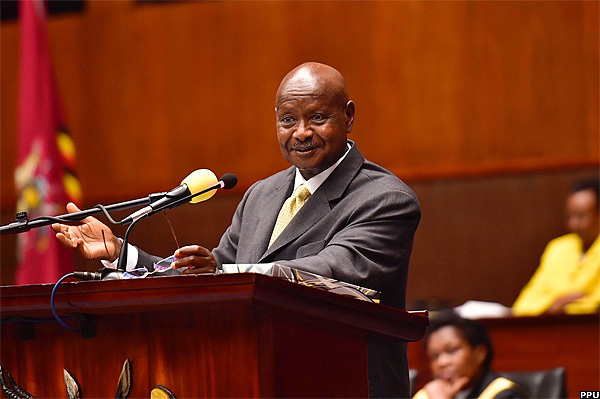
____________________________________
8:20am
Kasaija's task cut out
The finance minister is expected to:
- report on the performance of the economy
- present the budget strategy
- update Parliament on the performance of key selected sectors in the financial year 2018/19 budget, and the priorities for the coming financial year
- highlight the financial year 2019/20 revenue measures to enhance domestic revenue mobilization and key priority expenditure allocations.
____________________________________
7:57am
A sh40trillion budget
This iconic briefcase may have maintained its physical 'figure' over the years, but the contents it holds spell out a national budget that has been growing year after year - and from the look of things, there is no turning back.
Today, minister Matia Kasaija will read out a sh40.4 trillion budget to the Rebecca Kadaga-led Parliament.

Kasaija is expected to unveil the spending plans for 2019/2020 and also show how the the ministry that he leads plans to fund Uganda's largest budget thus far.
Of course, to adequately accommodate the needs of the different sectors, taxation and loans are also involved in this large economic blender.
____________________________________
7:40am
Good morning
Hello everyone, rise and shine! A fresh Thursday is unfurling before our very eyes and the birds are delightfully taking flight to enjoy Mother Nature's awesomeness.
Most of you know already that this is no ordinary Thursday as far as Uganda's economy is concerned. No, it's not a public holiday, so if you are still lazying underneath your bed sheets, it's time to swing out of that comfort zone and get your body engine going -- it's a normal working day, I mean.
Anyways, it's a big day for Uganda's finance minister Matia Kasaija, who is scheduled to read the national budget for the new financial year starting July 1.

____________________________________